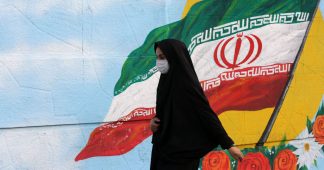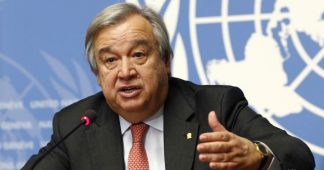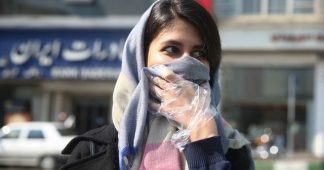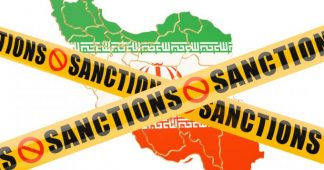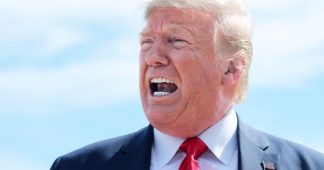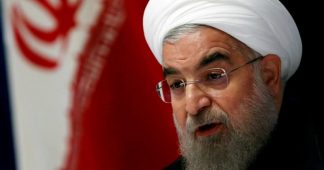The Foundation for Defense of Democracies and American Enterprise Institute are aggressively campaigning for military escalation and a tightening of sanctions.
April 27, 2020
Since the global Covid-19 pandemic began, a cluster of U.S. think tanks has been aggressively lobbying the Trump administration to escalate militarily toward Iran and tighten U.S. sanctions. This push has come despite warnings that such sanctions are worsening the death toll of Iran’s outbreak, which is one of the worst in the world. The think tanks leading this effort—the Foundation for Defense of Democracies (FDD) and American Enterprise Institute (AEI)—have cranked out non-stop statements, research documents, videos and media appearances since the crisis began. They are not shouting into the wind, but speaking directly to an administration that has proven willing to act upon their words.
In the 47 days since March 11, when the World Health Organization declared Covid-19 a global pandemic, the FDD has posted 56 articles, podcast interviews and videos on its website which either demonize Iran as a uniquely bad actor or urge the United States to take a confrontational posture towards the country. While the steady stream of anti-Iran invectives is not new, the insistence that the Covid-19 crisis builds their case is. One piece from April 14, for example, argues that the crisis strengthens the case for “regime change,” because it will diminish “the regime’s credibility even further and add fuel to the outrage and anger that have been building for years.” The unproven theory that mass suffering will accelerate an uprising against the government has long been used to justify a host of punishing U.S. policies against the Iranian people, including sanctions—a form of collective punishment has only unleashed poverty and premature death upon ordinary people.
Yet, throughout the crisis, the FDD has published a flurry of materials arguing that the United States must not let up sanctions during the pandemic. The organization is funded by pro-Israel billionaires and started out in 2001 as an explicitly pro-Israel organization called EMET (Hebrew for truth). Since the pandemic began, it has published written and video posts that include: “Tehran Can Afford to Fight Covid-19 Even Without Sanctions Relief,” “The Coronavirus Is Absolutely No Excuse To Lift Sanctions on Iran” and “Humanitarian channels to Iran continue to be wide open.” In a March 27 video, Mark Dubowitz, the chief executive of FDD, released a video arguing that “the Iranian people know that this is the wrong time to give sanctions relief.”
In fact, doctors in Iran have been begging the Trump administration for relief from sanctions, which are cutting off critical medical supplies, like ventilators, leading to an increase in Covid-19 deaths. While humanitarian exemptions technically exist on paper, they are rendered largely meaningless by a difficult-to-navigate web of sanctions, as well as threats and intimidation from the Trump administration, which have scared global banks and firms from doing business with Iran. Researchers were warning that sanctions were causing a shortage in medical supplies before the outbreak began: As Human Rights Watch said on April 6, “these exemptions have failed to offset the strong reluctance of U.S. and European companies and banks to risk incurring sanctions and legal action by exporting or financing exempted humanitarian goods.”
Hoda Katebi, an Iranian-American community organizer with the No War Campaign, told In These Times that the FDD’s role is “wildly ruinous—there’s no nicer way to put it.” According to Katebi, “You’d think a humanitarian crisis would be a time when war hawks pause rather than ramp up their project. It is telling what their goal is. With all their talk about wanting to help the Iranain people, it’s very clear it’s quite the contrary.”
Amid calls for sanctions relief, the Trump administration has only dug in more, with Secretary of State Mike Pompeo issuing a statement on March 18 announcing a new round of sanctions that “will deprive the regime of critical income from its petrochemical industry and further Iran’s economic and diplomatic isolation.” This was soon followed by the Trump administration’s intervention to block an emergency $5 billion loan to Iran from the International Monetary Fund (a position the FDD also supported). But this did not satisfy the FDD. On April 23, a group of “experts and formal officials” signed a letter to Trump urging his administration to “double down on the maximum pressure campaign.” Of the 50 people who signed, 22 were from the FDD, according to a report in the conservative publication The National Interest.
Cavan Kharrazian, international program researcher for the Center for Economic and Policy Research, told In These Times, “Their letter echoes the State Department’s categorically false line that these broad economic sanctions have no humanitarian effects. Despite claiming that their ‘hearts go out’ to the Iranian people, they actively contribute to an extremely dangerous foreign policy that harms millions of ordinary Iranians and pushes us closer to escalating military conflict.” This danger is underscored by Trump’s April 22 claim that, “I have instructed the United States Navy to shoot down and destroy any and all Iranian gunboats if they harass our ships at sea”—a reference to the U.S. Navy’s Fifth Fleet in the Persian Gulf.
One of the signatories is the FDD’s senior advisor Richard Goldberg, who worked in the Trump administration from 2019 to 2020 while he was also at the FDD. When serving as Trump’s national security advisor, John Bolton created a job just for Goldberg: “director for countering Iran’s weapons of mass destruction.” As Bloomberg reports, “The goal was to counter what Bolton saw as a desire at the departments of State and Treasury to weaken the ‘maximum pressure’ campaign against Iran.” While Goldberg served on the National Security Council, he remained on the salary of the FDD.
Goldberg’s double role is not the only evidence of a close relationship between the FDD and the Trump administration. When Iran declared in August 2019 that it was imposing sanctions on the FDD and Dubowitz for “unilateral and illegal economic terrorism,” Pompeo came to the think tank’s defense. “The U.S. does not take these threats lightly, and will hold the regime and its ‘apparatuses’ to account,” he tweeted. On April 17, Juan Zarate, Chairman of the FDD’s “Center on Economic and Financial Power,” appeared on a roundtable, organized by the Center for a New American Security (CNAS), alongside Andrea Gacki, director of the Office of Foreign Assets Control for the U.S. Department of the Treasury, where he argued in favor of U.S. sanctions. Among the FDD’s biggest funders is billionaire and Home Depot co-founder Bernard Marcus, who was one of Trump’s largest donors in 2016 and has been clear about his fervent belief that “Iran is the devil,” as Eli Clifton reported.
According to Kharrazian, “In the realm of public opinion, FDD CEO Mark Dubowitz is continually quoted in major publication pieces on Iran, such as the New York Times, and FDD staff members routinely host or sit on panels throughout the beltway regarding Iran. Additionally, their ‘experts’ have regularly testified in Congress on foreign policy towards Iran.”
But perhaps the clearest sign of influence is how closely the Trump administration’s rhetoric mirrors that of the FDD. On April 6, the State Department published a fact sheet titled “Iran’s Sanctions Relief Scam.” This bizarre, screedy document is worth comparing with an FDD memo published the day before: the overlap in messaging, historical examples, and specific data cited is striking. As Kharrazian notes, this is not an isolated case: “If you read the statements coming from Trump’s State Department on Iran and the ‘maximum pressure’ campaign, they appear almost completely ideologically aligned with these think-tanks’ own positions and talking points, especially during the Covid-19 crisis.”
FDD is not alone in its campaign. The AEI, which has received millions from Koch foundations, as well as corporations such as ExxonMobil, has launched a campaign to counter activists who are calling for sanctions relief. Yasmine Taeb, senior policy counsel at Demand Progress, tells In These Times, “FDD and AEI have always pushed for policies aimed at war. FDD led the charge against the Iran nuclear deal under Obama, and it opposes U.S. diplomacy with Iran on principle: It sees any U.S. relationship with Iran as coming at the expense of the U.S. relationship with Israel, and it has a track record of supporting escalation for the sake of escalation.”
“The difference between the FDD and AEI today is that the AEI is a prominent conservative organization that supported Bush’s march to war in Iraq in 2003,” she continues. “It is not leading the charge for war with Iran today: The FDD is playing the role that the AEI played in the lead-up to the Iraq War.” Notably, AEI’s board of trustees includes former Vice President Dick Cheney alongside and a number of corporate leaders, including Christopher B. Galvin, former CEO and chairman of Motorola.
While the AEI might not be playing as large a role as the FDD, it also is not silent. On March 20, 26 progressive organizations released a statement asking “President Trump, Sec. Mnuchin, and Sec. Pompeo to loosen the administration’s crippling sanctions regime on Iran for 120 days in order to aid the Iranian people’s fight against the virus.” AEI responded with a press effort to oppose that effort. On March 24, AEI resident scholar Michael Rubin directly blasted the letter in an op-ed in the Washington Examiner titled, “Don’t lift Iran sanctions, not even for the coronavirus.”
Then, on March 25, AEI senior fellow Danielle Pletka wrote an op-ed in The Dispatch titled, “Sorry, now is not the time to lift sanctions on Iran.” That piece also responds to the letter from 26 organizations calling for sanctions to be lifted. In late March, Sen. Bernie Sanders, Reps. Alexandria Ocasio-Cortez and Ilhan Omar and others circulated a letter calling for immediate sanctions relief for Iran (that letter would be publicly released on March 31 with 34 congressional signatures). On March 25, Rubin wrote an article for The National Interest titled “Sorry, AOC: Donald Trump can’t give Iran a sanctions pass for coronavirus.”
Nahid Soltanzadeh is a digital campaigner for the Muslim grassroots organization MPower Change, which is part of the #EndCOVIDSanctions coalition that released a March 31 letter applauding those members of Congress who spoke out against U.S. sanctions. They said that the push by both the AEI and FDD to increase sanctions “is enraging and only enables the Office of Foreign Assets Control to continue letting Iranians die from Covid-19.” Soltanzadeh underscored, “They create an environment where OFAC can escape accountability to the U.S. public or Congress—both of which are overwhelmingly demanding a temporary lift on Iran sanctions.”
Katebi says the AEI’s campaign is a sign of the effectiveness of sanctions opponents: “For them to be going so strong, it’s only because they’re seeing the work and impact we’ve been having as a campaign.”
Like the FDD, AEI’s support for sanctions stems from a larger push towards military escalation. On April 10, Gary Schmitt, “resident scholar in strategic studies and American institutions” for AEI, wrote a piece in The American Interest titled, “Don’t slash the defense budget to pay for Covid-19.” He argued that any cuts would pose a security threat to the United States, in part because “Russia, China, and Iran have become more aggressive and more potent adversaries.” On April 2, Kenneth M. Pollack, a resident scholar at AEI, echoed FDD in speculating on whether the mass suffering caused by Covid-19 could hasten the regime’s end: “While Covid-19 seems unlikely to be the trigger for the fall of the Islamic Republic, when the regime’s history is finally written, it may very well be that we will look back on this crisis and say that it helped hasten its end.” Notably, Pollack was a major pusher of the Iraq war, who was cited by New York Times columnist Bill Keller as a reason the latter supported that war.
Meanwhile, some at AEI are making the case that “bad actors” like Iran will try to take advantage of the crisis, so the United States should too. Hal Brands, resident scholar for AEI, wrote an article for Bloomberg opinion on April 20 titled, “The world’s bad actors see coronavirus as an opportunity.” He wrote, “There will always be predatory actors looking to exploit weakness and disorder, even if that disorder affects them as well. If the guardians of order are absent, the balance will be broken, and the results will not be pretty.”
Amid an unprecedented global crisis, the self-declared “guardians of order” see an opening to push for more war, death and destruction. In the words of Taeb from Demand Progress, “It’s pretty disgusting, because we’re talking about a global pandemic that has claimed the lives of hundreds of thousands of people. We’re talking about innocent people dying.”
* Ambi Colón Nuñez and Juan Caicedo contributed research to this report.
